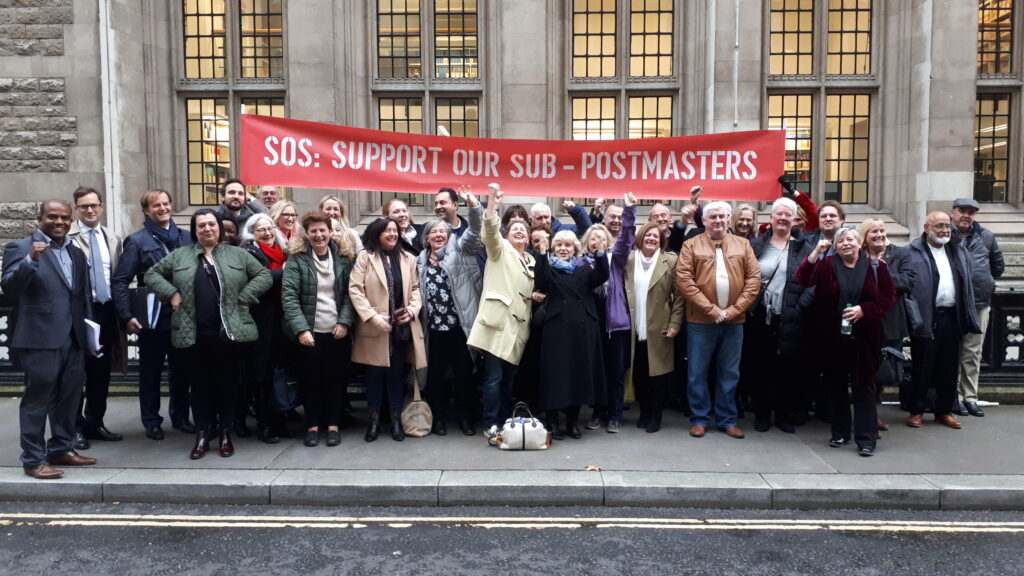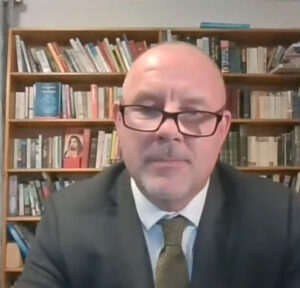Howe and Co sit down with BEIS officials to see just how serious the government is about compensation

On 19 January 2022 a meeting was held between officials from the Department of Business, Energy and Industrial Strategy and three lawyers from Howe and Co, who represent 146 Subpostmasters at the Statutory Inquiry into the Post Office Horizon IT disaster.
The meeting had been called by Howe and Co on the back of some vague promises by the Postal Affairs Minister Paul Scully that he was going to “continue to work” with Alan Bates and the Justice for Subpostmasters Alliance to see what can be done to properly compensate the 555 Subpostmasters who took the Post Office to the High Court and blew the scandal wide open.
Though the Subpostmasters won the case in December 2019, it finished in a settlement which saw them receive £57.75m, all but £12m of which was swallowed by legal and litigation funder success fees.
Immediately following the settlement of the litigation, Alan Bates, the founder of the Justice for Subpostmasters Alliance issued the government with an invoice for the remaining £46m. It was refused.
Bates has been fighting the government for that money ever since, turning his campaign into a Parliamentary Ombudsman complaint in December 2020 and escalating the claim to £300m in the process, which he said properly reflected what the 555 had actually lost.
Post Office CEO swaps sides

Things took an interesting twist in April last year, when Nick Read, the Post Office Chief Executive, signalled he also thought the Bates v Post Office litigation settlement which he had negotiated was unfair. Claiming ignorance of the litigation funding system, Read said of the settlement:
“it has only become apparent through various news reports since quite how much of the total appears to have been apportioned to the claimants’ lawyers and funders”
Read called on the government to “ensure that all Postmasters affected by this scandal are compensated and compensated quickly.”
This meant that both men who had signed the settlement agreement which ended Bates v Post Office now thought it was no longer fit for purpose. The government had other ideas. Since assuming his post in early 2020, the Postal Affairs minister Paul Scully has been telling anyone who would listen that the compensation received by the 555 was “full and final“. This mantra has been dented by:
– the sustained sound and fury coming from backbench MPs and peers who have relentlessly held the government’s feet to the fire on this
– Alan Bates’ focus on grinding away at the government via any avenue open to him, including making a complaint to the Parliamentary Ombudsman and lobbying the Statutory Inquiry to cover the issue
– the background threat of legal action against the government for its part in the Horizon scandal
How far we’ve come
It is worth bearing in mind that in the months after the Bates v Post Office settlement, not only was the government not proposing any further discussion about compensation for the 555, it was not even considering a review of what went wrong. On 25 February 2020, the BEIS minister Lord Callanan told peers there will be:
“a series of quarterly meetings between the CEO and Ministers, to make sure that we put in place all the appropriate accountability that is required.”

That was it. By spring 2020, the BEIS minister Paul Scully was promising the government was committed to establishing “an independent review”. This was formally announced in June 2020 and became statutory nearly a year later on the request of its chair after the April 2021 finding at the Court of Appeal which ruled the indiscriminate criminal prosecution of Subpostmasters on the basis of untested IT evidence was a bad idea.
The only other thing to note is that the JFSA (which effectively is Alan Bates, advised by forensic accountant Kay Linnell) doesn’t appear to be working directly with Howe and Co any more, despite Alan encouraging his followers to sign up with them in May last year.
Matters seem to have come to a head over how explicit the issue of compensation was in the terms of the Statutory Inquiry. Bates did not think they were explicit enough, Howe and Co felt they were. Bates has since withdrawn the JFSA as a core participant to the Inquiry (but agreed to co-operate with it), leaving Howe and Co representing those Subpostmasters (many of them JFSA “members”) who wish to remain core participants.
Is that all clear? Good.
So what happened on Wednesday, then?
According to a briefing note sent to Howe and Co’s 146 Subpostmaster clients, the meeting was attended by BEIS officials and David Enright, Martin Howe and John Sheridan, all from Howe and Co. Mr Enright told the BEIS reps that Paul Scully had already said that the Bates v Post Office settlement:
“was “not equitable” (i.e. not fair).”

The note goes on to say:
“Mr Enright also reminded the BEIS representatives that the Minister had told the Committee that “[compensation of subpostmasters] is by far and away the most pressing issue in my list of responsibilities as minister”. Mr Enright stated that subpostmasters wanted the Minister’s words translated into deeds without further delay.”
But how?
“We advised that the legal and legal funding costs could simply be returned to Freeths LLP (solicitors who conducted the Group Litigation against Post Office). They, with the assistance of the JFSA Steering Committee, could distribute those monies efficiently. It is our view that Freeths and the JFSA Steering Committee would be best placed to distribute the legal and legal funding costs, if repaid, as they conducted the litigation and handled the distribution of the settlement funds in the first instance.”
It goes on:
“We emphasised that Howe + Co have not sought any monies from subpostmasters for our work in persuading the Department for Business and Post Office Limited to return the legal and legal funding costs to the claimants in the Group Litigation. However, we emphasised that it was a priority that these monies be returned to our clients and the other group litigants.”
Unfortunately the BEIS mandarins listening to this did not have any authority to make any agreement with Howe and Co over compensating their clients. So what now? The note continues:
“Following the meeting, we briefed the Steering Committee of the JFSA on the outcome of the meeting. We also briefed Freeths [the claimants’ solicitors in Bates v Post Office] of the conduct and outcome of that meeting, who were grateful for the work we had done on this vital issue. We understand that Freeths and the Steering Committee of the JFSA will be meeting the BEIS officials that we met with in the near future.”
Now that is interesting. The Howe and Co briefing note concludes:
“We have done all we can to lay the groundwork for that further meeting and to create a positive attitude from BEIS and the Minister in taking what will be a highly unusual step of effectively re-opening a full and final settlement where BEIS understands costs were provided for within the settlement agreement. It will now be for the Steering Committee of JFSA and Freeths to provide BEIS with information and assurances to build on the groundwork we have done to secure repayment of part or whole of the legal and funding costs for the 555.”

Cynically speaking, you could say that it has taken two years and huge amounts of energy on the part of dozens of parliamentarians, campaigners and lawyers to get to the point where unelected government mandarins with no authority to make decisions have finally indicated they are willing to have a meeting with Alan Bates and Kay Linnell, and… er… that’s it.
On the other hand, it does seem as if some serious and well-informed people believe that things are progressing in the right direction.
Alan Bates has already announced he is looking for new legal representatives to sue the government (“we have an open contract available to any law firm that wants to pick up our case to have the settlement agreement set aside”), and it may be the mere threat of this is enough to keep officials talking.
Even if the government think they have a watertight case, it wouldn’t exactly look great if they decided they were going to let things go back to the High Court, this time in the full glare of the UK’s media.

Leave a Reply